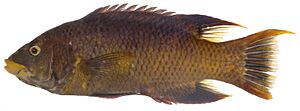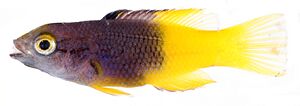Spanish hogfish facts for kids
The Spanish hogfish, Bodianus rufus, is a colorful fish that lives in the ocean. It's a type of wrasse, which is a family of fish known for their bright colors and interesting behaviors. You can find the Spanish hogfish in the western part of the Atlantic Ocean, from places like North Carolina and Bermuda all the way down through the Caribbean Sea and the Gulf of Mexico to southern Brazil.
Quick facts for kids Spanish hogfish |
|
|---|---|
 |
|
| Adult | |
 |
|
| Juvenile | |
| Conservation status | |
| Scientific classification |
|
| Kingdom: | Animalia |
| Phylum: | Chordata |
| Class: | Actinopterygii |
| Order: | Labriformes |
| Family: | Labridae |
| Genus: | Bodianus |
| Species: |
B. rufus
|
| Binomial name | |
| Bodianus rufus (Linnaeus, 1758)
|
|
| Script error: The function "autoWithCaption" does not exist. | |
| Synonyms | |
|
|
Script error: No such module "Check for conflicting parameters".
Contents
Where Spanish Hogfish Live
These fish love to live in coral or rocky reefs. They can be found in waters that are not too deep, usually from about 3 feet (1 meter) down to about 230 feet (70 meters). Reefs provide them with plenty of places to hide and find food.
What Spanish Hogfish Eat
Spanish hogfish have different diets depending on their age.
Adult Diet
Adult Spanish hogfish are not picky eaters! They enjoy a variety of foods found on the reef. Their meals often include molluscs like sea snails, mussels, and even squid. They also munch on crustaceans, which are like tiny ocean bugs, and echinoderms such as brittle stars and sea urchins. Sometimes, they will eat worms and even small fish.
Juvenile Cleaner Fish
When they are young, Spanish hogfish have a very special job. They act as "cleaner fishes." This means they help other, bigger fish by eating tiny parasites and dead skin off their bodies. It's like a spa treatment for other fish, and the young hogfish get a meal out of it!
Size and Appearance
The Spanish hogfish can grow to be quite large for a reef fish, reaching up to about 16 inches (40 centimeters) long. However, most of the ones you might see are usually around 11 inches (28 centimeters) long. They are known for their vibrant colors, which help them blend in with the colorful coral reefs.
Importance to Humans
Spanish hogfish are not a major source of food for people, but they are sometimes caught by local fishermen for food. They are also popular in the aquarium trade because of their beautiful colors and interesting behavior. People who have home aquariums enjoy watching them swim around.
 | May Edward Chinn |
 | Rebecca Cole |
 | Alexa Canady |
 | Dorothy Lavinia Brown |


